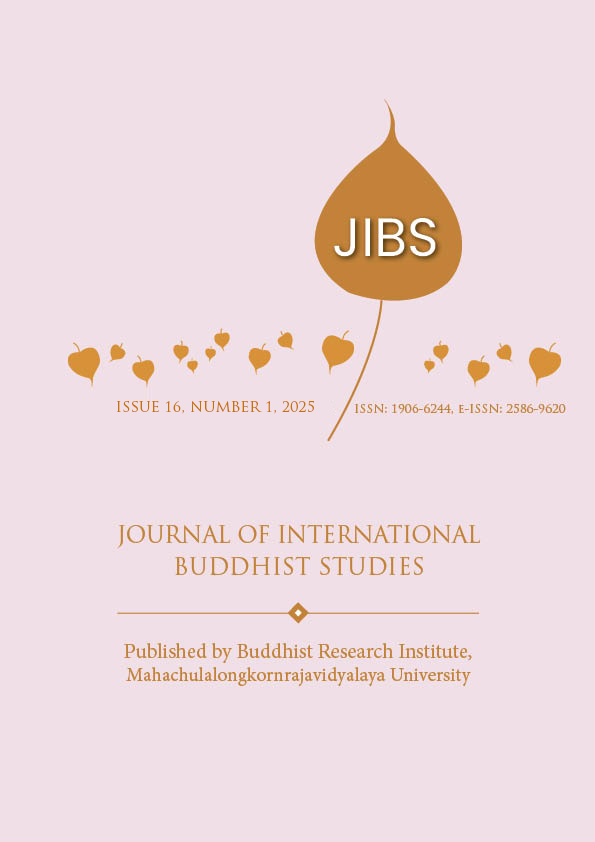The Application of the Concept of Saṅkhāra (Mental Formation) in Theravāda Buddhist Psychology for Reducing Human Mental Suffering in Modern Life
DOI:
https://doi.org/10.65680/jibs.4247Keywords:
Saṅkhāra, Mental Formation, Theravāda Buddhist Psychology, Human Mental Suffering, Modern LifeAbstract
This paper critically evaluates the concept of saṅkhāra within early Theravāda Buddhist knowledge, addressing gaps in prior studies by Bandusena Wickranmasinghe Dadanayaka and Venerable Nodhiñana, who primarily emphasize the doctrinal and causal aspects of saṅkhāra without substantial engagement with its psychological implications. This research focuses on saṅkhāra’s role as “mental formations” integral to the cycle of dependent origination, particularly its connections with processes of becoming and rebirth and its profound impact on meditation practices. From a Theravāda Buddhist psychological perspective, the study explores how the concept of saṅkhāra contributes to liberating from human suffering, associating with the noble truth of suffering, and examines its practical applications in alleviating mental suffering. This includes a detailed analysis of saṅkhāra’s classifications, manifestations, and influence on the mind-body nexus. This comprehensive exploration not only deepens the understanding of saṅkhāra’s complexities but also highlights its relevance and applicability in contemporary efforts to mitigate human suffering, aiming to support individuals aspiring to achieve liberation from suffering and the state of an Arahant in the framework of Theravāda Buddhist Psychology.
References
Anālayo, Bhikkhu. Rebirth in Early Buddhism and Current Research. Boston: Wisdom Publications, 2018.
Anderson, D., and H. Smith, eds. Suttanipāta. London: PTS, 1968.
Bodhi, Bhikkhu. Investigating the Dhamma: A Collection of Papers. Kandy, 2015.
_____. The Connected Discourses of the Buddha: A Translation of the Saṃyutta Nikāya. Boston: Wisdom Publications, 2000.
_____. The Discourse on the All-Embracing Net of Views: The Brahmajāla Sutta and Its Commentaries. Kandy: Buddhist Publication Society, 1978.
_____. The Great Discourse on Causation: The Mahānidāna Sutta and Its Commentaries. Kandy: Buddhist Publication Society, 1995.
Bodhi, Bhikkhu. The Numerical Discourses of the Buddha: A Translation of the Aṅguttara Nikāya. Boston: Wisdom Publications, 2012.
Boisvert, Mathieu. The Five Aggregates: Understanding Theravāda Psychology and Soteriology. Delhi: Sri Satguru Publications, 1997.
Buddhadatta, A. P., ed. Sammohavinodanī. London: PTS, 1923.
Collins, Steven. Selfless Persons: Imagery and Thought in Theravāda Buddhism. Cambridge: Cambridge University Press, 1982.
Davids, C. A. F., ed. Tikapaṭṭhāna I–III (with commentary). London: PTS, 1921–23.
_____. Paṭṭhāna. London: PTS, 1906.
_____. Vibhaṅga. London: PTS, 1904.
De Silva, Padmasiri. An Introduction to Buddhist Psychology and Counselling: Pathways of Mindfulness-Based Therapie. London: Palgrave Macmillan, 2014.
Hardy, E., ed. Aṅguttara-nikāya III, IV, V. London: PTS, 1960.
_____. Nettippakaraṇa. London: PTS, 1902.
Hoffman, Frank J. Rationality and Mind in Early Buddhism. Delhi: Motilal Banarsidass, 1987, 1992, 2002.
Mahāsi Sayadaw. Manual of Insight. Translated by the Vipassanā Mettā Foundation Translation Committee. Forewords by Joseph Goldstein and Daniel Goleman. Boston: Wisdom Publications, 2016.
Nandamālābhivaṃsa Sayadaw, Dr. The Analytical Study of Dependent Origination: Paṭicca-samuppāda in the Perspective of Conditional Relations (Paṭṭhāna). Yangon: 2019.
Taylor, A. C., ed. Kathāvatthu I–II. London: PTS, 1894–7.
_____. Paisambhidāmagga I–II. London: PTS, 1905–7
Thiṭṭhila Ashin Pathamakyaw (Aggamahāpaṇḍita). The Book of Analysis (Vibhanga). Oxford: The Pali Text Society, 2010.
Downloads
Published
How to Cite
Issue
Section
License
Copyright (c) 2025 Journal of International Buddhist Studies

This work is licensed under a Creative Commons Attribution 4.0 International License.











